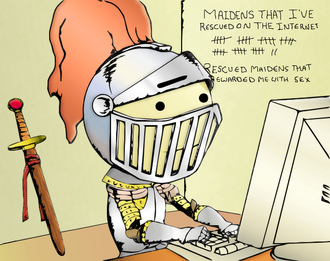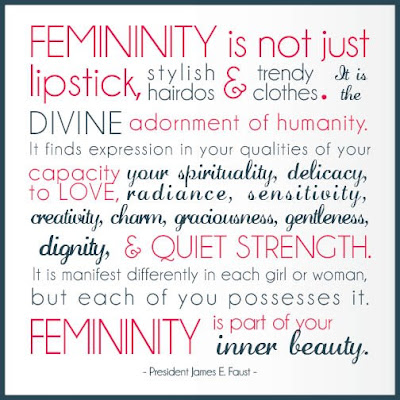But the thing is, I'm a writer and I'm opinionated and passionate. I have lots of feelings and I cope with them by writing them out.
There's been a lot of fuss among Mormons on the Internet lately about Ordain Women. The leaders of OW decided to bring more attention to their cause by hosting an event where they wait in line at the Priesthood session of this October's General Conference. This is because women have never been allowed into the session before, despite it being broadcast and shared publicly after the event. Also, because they see themselves as future priesthood holders. You can read more about the event here. And probably some other locations.
Of course, many Mormons are in an uproar against this. They've flocked to Facebook to tell OW and Mormon feminists how unrighteous and wrong we are. And I'm getting really sick of it. First of all, they are being extremely rude, divisive, and not at all Christlike. Which is pretty ironic considering that they're calling us "apostates." But also, their arguments are completely illogical, offensive, and just plain wrong.
So I've decided to tear apart some of these awful arguments, one blog post at a time. (I should probably preface this by saying that while I have no interest in obtaining the priesthood for myself, I support the efforts of OW and find it absolutely ridiculous that people are so vehemently against it. I mean really, why can't we even entertain the notion?)
Here's the first argument I've been hearing:
"If women get the priesthood, they will have no need for men. Women shouldn't get the priesthood because they should depend on men."
These are two different arguments, but they essentially amount to the same idea. Women should need men and if they have the priesthood, they won't.
This argument is wrong for a few different reasons. I'm sure if the people making this argument really thought it through, they would realize how illogical it is.
The idea that women wouldn't need men would supposedly have two manifestations:
- Wives wouldn't need men in their marriage or as a father to their children.
- Women wouldn't need men to help run the Church.
The problem with #1 is that women do not marry men for their priesthood. Women marry men because they love them. Women and men complement each other not because one is a priesthood holder while the other is a nurturer, but because they are both individuals with unique attributes.
I'm gonna use my marriage as an example because that's what I've got. My husband and I complement each other in many ways. One of them is that I tend to get passionate and angry much more easily than he does. He's more even-tempered. Neither of those attributes have to do with our sex - come on, guys, we've all seen hot-tempered men and women!
The other issue with #1 is that most women in the world aren't married to men who hold the priesthood. Even many LDS women have husbands that have never been members or are inactive. Most of those women still need their husbands, even though they don't hold the priesthood. They still have very happy, functional marriages.
This is also a very sad argument to me. I really hope the women (and men) who use this argument as a reason why women shouldn't receive the priesthood don't really mean it. They may not realize it, but when people use this argument, it makes it sound like the only reason why they are married is for their husband's priesthood authority. What would happen if their husband became inactive and no longer had his former priesthood authority? Would the wife leave him? And for men who use this argument - do you really want your wife to think of you this way? Do you really want a wife who is spiritually dependent on you, rather than able to have her own spirituality?
Now to #2. Again, an out-of-church comparison makes this one fall apart. The Church is an organization, much like a business. Probably moreso like a business than most other churches. And businesses all function with both men and women. Sometimes women are the bosses and the authority figures, often the men are. Either way, businesses absolutely need people of both sexes to help it run to its best capacity.
If women were to be ordained in the future, men would not be kicked out of the Church. They would not stand around with nothing to do while women covered everything. Men and women would work together, both holding about half of the callings, doing half of the work, and having half of the authority.
Essentially what this argument amounts to for me is "woman, know thy place."
I have no problem with a member of the Church believing that women are not meant to receive the priesthood at this time, or ever. However, there are absolutely no good arguments against it. I'm okay with anyone who thinks that we just have to trust in the Lord, but I'm not okay with anyone who does any sort of mental gymnastics in an attempt to come up with any sort of reason for why women don't and never should have the priesthood.
I had an uncle-in-law who simply and authoritatively said to me "not gonna happen" when I told him about the existence of OW. It annoyed me that he said it that way, but I also appreciated that he didn't have any sort of argument against it.
I repeat: We don't currently know why women don't have the priesthood. That is something Heavenly Father has never revealed to us. Therefore, there is no good argument against it other than "it just is."
I hope you can appreciate that and understand that. If not, well, then, even though it is tough to be a Mormon feminist, I have pretty thick skin.








.jpeg)










